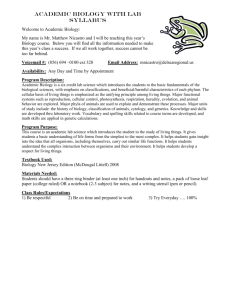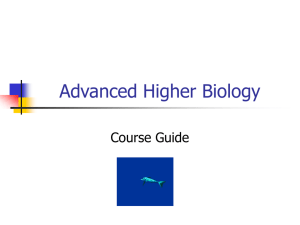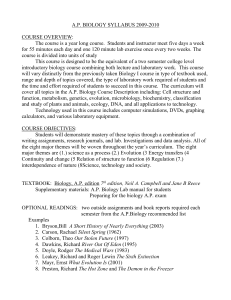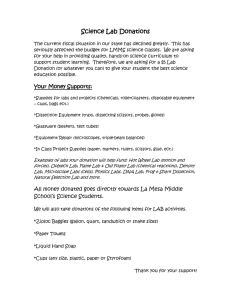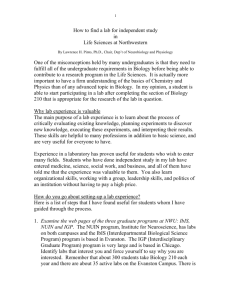AP Biology 2015-16 Course Syllabus
advertisement
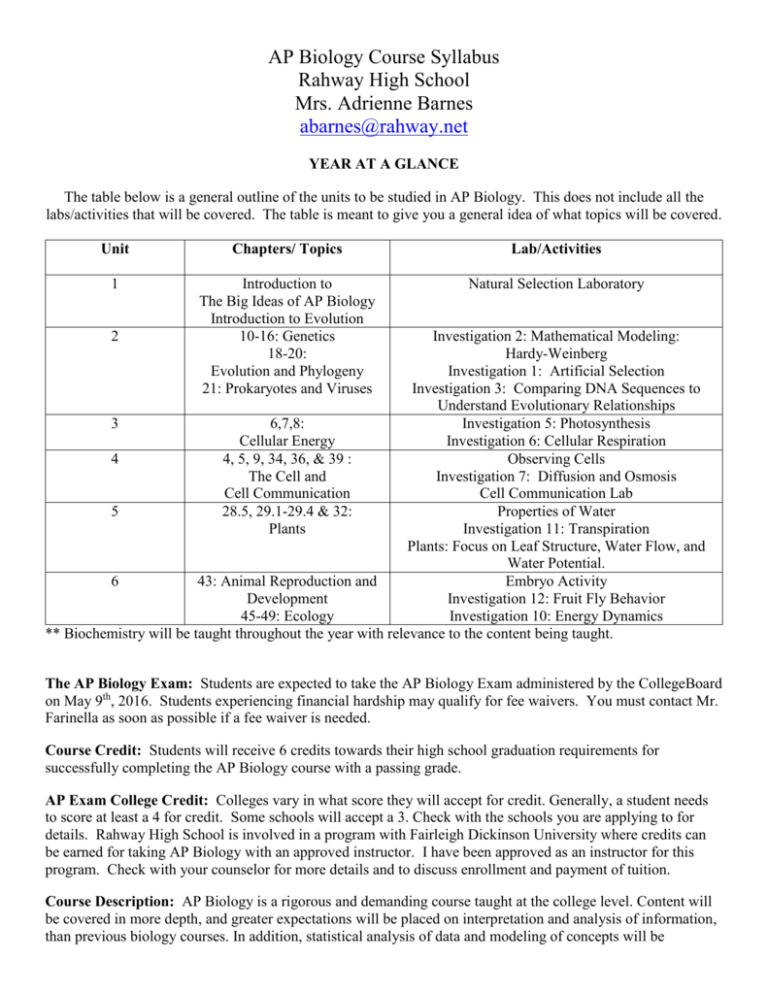
AP Biology Course Syllabus Rahway High School Mrs. Adrienne Barnes abarnes@rahway.net YEAR AT A GLANCE The table below is a general outline of the units to be studied in AP Biology. This does not include all the labs/activities that will be covered. The table is meant to give you a general idea of what topics will be covered. Unit Chapters/ Topics Lab/Activities 1 Introduction to The Big Ideas of AP Biology Introduction to Evolution 10-16: Genetics 18-20: Evolution and Phylogeny 21: Prokaryotes and Viruses Natural Selection Laboratory 2 Investigation 2: Mathematical Modeling: Hardy-Weinberg Investigation 1: Artificial Selection Investigation 3: Comparing DNA Sequences to Understand Evolutionary Relationships 3 6,7,8: Investigation 5: Photosynthesis Cellular Energy Investigation 6: Cellular Respiration 4 4, 5, 9, 34, 36, & 39 : Observing Cells The Cell and Investigation 7: Diffusion and Osmosis Cell Communication Cell Communication Lab 5 28.5, 29.1-29.4 & 32: Properties of Water Plants Investigation 11: Transpiration Plants: Focus on Leaf Structure, Water Flow, and Water Potential. 6 43: Animal Reproduction and Embryo Activity Development Investigation 12: Fruit Fly Behavior 45-49: Ecology Investigation 10: Energy Dynamics ** Biochemistry will be taught throughout the year with relevance to the content being taught. The AP Biology Exam: Students are expected to take the AP Biology Exam administered by the CollegeBoard on May 9th, 2016. Students experiencing financial hardship may qualify for fee waivers. You must contact Mr. Farinella as soon as possible if a fee waiver is needed. Course Credit: Students will receive 6 credits towards their high school graduation requirements for successfully completing the AP Biology course with a passing grade. AP Exam College Credit: Colleges vary in what score they will accept for credit. Generally, a student needs to score at least a 4 for credit. Some schools will accept a 3. Check with the schools you are applying to for details. Rahway High School is involved in a program with Fairleigh Dickinson University where credits can be earned for taking AP Biology with an approved instructor. I have been approved as an instructor for this program. Check with your counselor for more details and to discuss enrollment and payment of tuition. Course Description: AP Biology is a rigorous and demanding course taught at the college level. Content will be covered in more depth, and greater expectations will be placed on interpretation and analysis of information, than previous biology courses. In addition, statistical analysis of data and modeling of concepts will be expected. A significant amount of studying must be completed at home to allow time for discussion, labs, and inquiry during class time. The CollegeBoard redesigned the curriculum in 2013, and, although the amount of material has been reduced, the emphasis on scientific thinking and analytical thinking has increased. The new AP Biology curriculum encompasses 4 “Big Ideas” with essential knowledge, process skills, and science practices that support each one. Big Idea 1: Evolution – The process of evolution drives the diversity and unity of life. Big Idea 2: Cellular Processes (Energy and Communication) – Biological systems utilize free energy and molecular building blocks to grow. Big Idea 3: Genetics and Information Transfer – Living systems store, retrieve, transmit, and respond to information essential to life processes. Big Idea 4: Interactions – Biological systems interact and these systems and their interactions possess complex properties. Class Expectations: Come to class prepared! In order to facilitate class discussions and reduce lecture time in favor of labs and knowledge enhancing activities, you must complete all required assignments. AP assignments are not ‘busy work’; they are designed to help you learn difficult material. Come to class! The work we will be doing during class cannot be replicated at home, labs in particular. You have committed to an advanced class that requires your presence in the classroom. Missed labs cannot be made up and will receive a score of zero. Study at home! The convention for college courses is 3 hours of independent study for each hour of class. In order to have productive class discussion, you must review the material at home. No whining! This is a college level course. It will be challenging. It will require a significant amount of time outside of class. If you do not like biology, this is not the class for you. Yes, you have to write in complete sentences! Yes, you have to show your work! Yes, you have to write out procedures, data tables, and label graphs! Yes, you are expected to show a higher level of understanding on ALL of your assignments! No, you may not write in ‘text-speak’! Class policies: 1. Cell phones and other electronics are silenced and stored in bag unless you are instructed to do otherwise by your teacher. Generally, during class, your brain should be turned on and your phone turned off. 2. Food and drink are generally not allowed in the classroom. Since we have one lab period during a lunch period, food will be permitted at that time. I encourage you to bring your lunch on lab day. If that is not possible, at the END of the first lunch period scheduled within the double period, you will be given permission to leave the classroom and get your lunch and bring it back quickly. Always come to class first. I will let you know the appropriate time to leave. 3. Late work will not be accepted. No exceptions, no excuses. 4. Do not throw any classwork away. You will need it to review for quizzes and tests in class as well as the AP exam on May 9th, 2016. 5. Cheating is unacceptable in any form. Cheating includes, but is not limited to: copying homework, copying lab analysis answers, plagiarizing written assignments, copying test answers, use of electronics to find test answers, having a phone out during a quiz or exam. If copying occurs all people involved will receive a zero on the assignment and a referral. You are in class to learn and succeed on the spring exam. Cheating DOES NOT help you learn. 6. Many classes will start with a 5 minute homework quiz. 7. You are responsible for your lab station. Keep it clean and organized to make lab breakdown easier at the end of class. Lab groups will not be dismissed until their lab station is cleaned completely. Grading: Grades will be assigned based on a straight percentage. Grades will not be rounded up (100-90 = A, 89-80 = B, 79-70 = C, 69-63= D, 62 and below = F). The grade will be broken down into the following categories: 50% - Tests/Quizzes 30% Labs 20% Classwork and Homework Material Requirements: Internet access! We will be using several websites to support coursework. Textbook – Starr and Taggart: Biology: Unity and Diversity of Life BioZone AP Biology Student Workbooks – Both have been purchased for you. 3-Ring Binder, Blue/black pens for labs, pencils, colored pencils Labs: Labs will constitute at 30% of the course work. The new curriculum includes more emphasis on inquiry based labs. This means you will design and implement your own experimental procedures for a significant number of labs. Formal lab reports will be completed for most labs. One free response question on the AP Bio Exam will relate directly to one of the AP Bio Lab Investigations conducted throughout the year. Homework: Homework should be completed every night. Usually, it will consist of reading assignments, answering questions, viewing lectures (Kahn Academy, Bozeman Biology), taking notes, or finishing labs. Even if a formal assignment is not given, you are expected to spend time reviewing content each night. AP Biology is a challenging class and cannot be ‘picked up’ during class time alone. You need to invest the time outside of class to be successful in class. Tests/quizzes: We will have unit tests at the end of each unit (larger units may be split up into 2 smaller tests) which will consist of multiple choice, grid-in, and free response questions. Tests are a large part of your grade (similar to a college course) and it is important that you prepare for them. Keeping current with lessons throughout the semester will help with test preparation. Quizzes will occur frequently. Quizzes will not be announced. Check the homework page every night for special announcements. Absences: AP courses are fast paced and cover a significant amount of content each day, particularly on lab and test days. It is extremely important that you attend class every day. Absences for school activities and field trips will not be approved more than 5 times during the year on non-lab days. Choose your days carefully. If you are ill, check the website, call a friend, or email Mrs. Barnes. You are still responsible for the content covered in class on the day of your absence. Participation: Always be prepared for class so you can fully participate. The goal this year is to promote more discussion and small group analysis of information, more lab time, and less lecture time. For this to work, you must be committed to completing the work required outside of class and to actively participating during class time. LAB SAFETY GUIDELINES: Science classes often involve hands-on laboratory activities. Many labs will involve potentially hazardous chemicals and materials. I refer to them as potentially hazardous because they are only hazardous if used inappropriately. There is no place in my class for unsafe use of materials. Thus, you will need to either be safe or be given a zero. You must read this contract carefully and have your parents read it. You will keep a copy in your notebook for reference and sign a copy to turn in to me. General guidelines 1. Conduct yourself responsibly at all times. 2. Follow all written and verbal instructions carefully. Ask questions if you do not understand. 3. Do not touch any equipment or materials before instructed to do so. 4. No food or drinks in the lab (unless it is your lunch time and then these should only be at your desk, not the lab bench). 5. Never start the lab unless you have received prior approval from me. 6. Always read and complete the pre-lab before you perform the lab. 7. Keep your work area neat and clean at all times! 8. Know the location and operation of all safety equipment. 9. Do not run, shout, or throw things in the lab. 10. Notify me if an unsafe condition exists in the classroom. 11. Dispose of all chemicals properly. I will instruct you about how to dispose of specific chemicals. 12. Keep your hands away from your face while doing labs. Always wash your hands after the clean-up. 13. Rinse out all glassware and leave it to dry in the designated locations. 14. Stay at your lab bench with your lab group during labs. 15. Carry sharps appropriately; tips down and away. 16. You will not be dismissed from class until lab stations are clean. 17. Immediately report ALL injuries, no matter how minor, to me. 18. Use the eyewash or shower if you are splashed with a chemical. Always assume that the chemicals are hazardous. 19. Use caution when using the hot plates; remember they are hot even though the top is white. 20. Never look directly into a container that is being heated. Observe from the side. Clothing 1. Goggles and aprons must be worn when instructed 2. Only close-toed shoes may be worn on lab days. No loose clothing or jewelry 3. Tie long hair behind your head. Handling Chemicals 1. 2. 3. 4. 5. Consider all lab chemicals to be hazardous. Double check the label before using a chemical Take only the amount of chemical you will use. Never let a chemical near your mouth. Never remove chemicals or other materials from the lab. Always hold chemical bottles with two hands when transporting them. Handling Glassware 1. Be cautious will all glass/Pyrex equipment. Never use chipped glassware. 2. Never handle broken glass. If a piece of glassware breaks, notify me immediately and I will dispose of it. 3. You will be responsible for paying for expensive broken equipment (i.e. microscopes slides = no, glass graduated cylinders = yes). Questions (Check appropriate answers) 1. Do you wear contact lenses? Yes _____ No _____ 2. Do you have allergies? Yes _____ No _____ If so, list specific allergies ______________________________________________________________________________________ ______________________________________________________________________________________ ______________________________________ Student Signature Date _____________________________________ Parent/Guardian Signature Date _______________________________________ Student Printed Name _____________________________________ Parent/Guardian Printed Name
